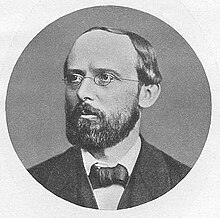Wilhelm von Christ

Wilhelm von Christ (2 August 1831 – 8 February 1906) was a German classical scholar.
Biography
He was born in Geisenheim in Hesse-Nassau. From 1854 till 1860 he taught in the Maximiliansgymnasium at Munich, and in 1861 was appointed professor of classical philology at the University of Munich.
Work
His most important works are:
- Die metrische Ueberlieferung der pindarischen Oden (1868)
- Geschichte der griechischen Literatur (5th ed., 1908 f.), a history of Greek literature down to the time of Justinian, one of the best works on the subject; after Christ died, this work was revised by Wilhelm Schmid
- Metrik der Griechen und Römer (1879)
- editions of Pindar (1887)
- edition of the Poetika of Aristotle (1878)
- Attikusausgabe des Demosthenes (1882)
- edition of the Metaphysica of Aristotle (1895)
- Iliad (1884)
His contributions to the Sitzungsberichte und Abhandlungen of the Bavarian Academy of Sciences are particularly valuable.
In 1886, Wilhelm Christ was the first who put forward the theory that the so-called Sea Peoples are identical with Plato's Atlanteans.[1] Later, this thesis was repeated under varying perspectives by scholars and researchers such as Theodor Gomperz, Spyridon Marinatos, Jürgen Spanuth, John V. Luce, or Herwig Görgemanns.
Further reading
- Otto Crusius, Gedächtnisrede (“Memorial talk [on Wilhelm von Christ]”; Munich, 1907).
Notes
- ^ Wilhelm Christ: Platonische Studien: Der Kritias ein historischer Roman, in: Abhandlungen der bayerischen Akademie der Wissenschaften, Vol. XVII, 2nd part, Munich 1886, pp. 451-512.
References
- . New International Encyclopedia. 1905.
Attribution
- This article incorporates text from a publication now in the public domain: Chisholm, Hugh, ed. (1911). "Christ, Wilhelm von". Encyclopædia Britannica (11th ed.). Cambridge University Press.
